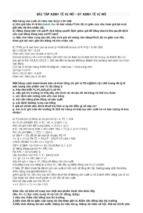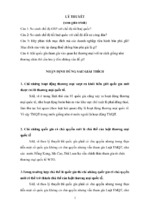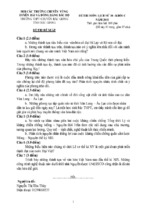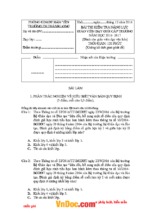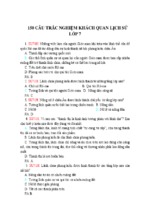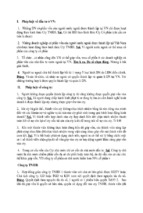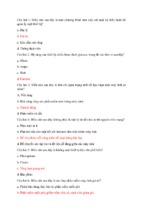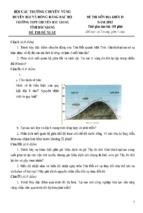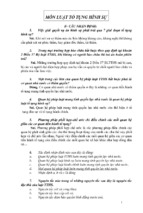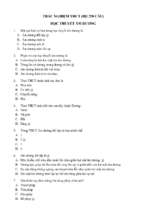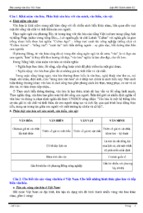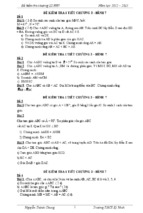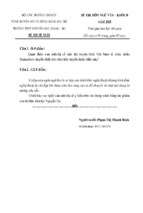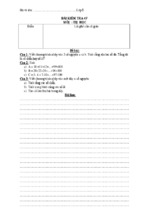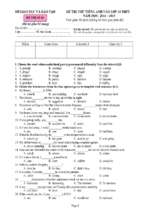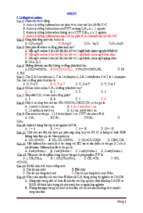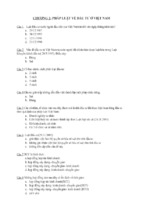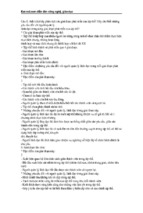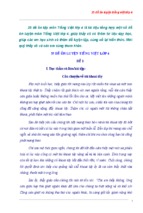UBND HUYỆN QUẾ SƠN
PHÒNG GIÁO DỤC VÀ ĐÀO TẠO
KỲ THI OLYMPIC HỌC SINH GIỎI LỚP 6, 7, 8
NĂM HỌC 2016-2017
Môn thi: TIẾNG ANH - LỚP 7
Thời gian: 120 phút (không kể thời gian giao đề)
Ngày thi : 13/04/2017
ĐỀ CHÍNH THỨC
SỐ PHÁCH
SỐ THỨ TỰ
(Do Chủ tịch HĐ chấm ghi)
(Do Giám thị ghi)
……………….
……………….
PHẦN GHI ĐIỂM DÀNH CHO GIÁM KHẢO
SECTION I
(0.5 điểm)
SECTION II
(7.0 điểm)
SECTION III
(6.5 điểm)
SECTION IV
(6.0 điểm)
Question 1: 5 câu
x 0.1đ
...... câu đúng
Question 1: 15 câu
Question 2: 6 câu
Question 3: 10 câu
Question 4: 10 câu
Question 1: 6 câu
Question 2: 10 câu
Question 3: 7 câu
Question 4: 5 câu
Question 1: 6 câu
Question 2: 6 câu
x 0.1đ
x 0.25đ
x 0.2đ
x 0.2đ
x 0.25đ
x 0.2đ
x 0.25đ
x 0.25đ
...... câu đúng
...... câu đúng
...... câu đúng
...... câu đúng
...... câu đúng
...... câu đúng
...... câu đúng
...... câu đúng
...... câu đúng
...... câu đúng
x 0.25 đ
....... điểm
....... điểm
....... điểm
....... điểm
Question 3:
Tổng điểm bài thi:
Điểm ghi bằng chữ:..................................................................
Chữ ký giám khảo 1:............................; Chữ ký giám khảo 2:..........................
........................................Thí sinh làm bài trực tiếp vào đề thi này....................................
Đề thi này gồm 07 trang được đánh số từ 1 đến 7. Thí sinh kiểm tra cẩn thận số trang trong đề trước khi làm bài.
SECTION I: PHONETIC (0.5pt) Circle the letter A, B, C or D before the word whose
underline part is pronounced differently from the other in each line.
0. A. sit
B. city
C. big
D. fine
1. A. occasion
B. ensure
C. closure
D. leisure
2. A. crab
B. album
C. bulb
D. comb
3. A. realize
B. disease
C. polish
D. typical
4. A. gold
B. gallery
C. regard
D. general
5. A. thought
B. month
C. though
D. healthy
Write your answers here:
0
D
1
2
3
4
5
SECTION II: VOCABULARY AND GRAMMAR (7.0pts)
Question 1 (1.5pt): Choose the best answer, A, B, C or D to complete the following sentences.
1. I checked___ drawer of my desk but I couldn't find my passport.
A. a lot of
B. some
C. every
D. all
2. ___for a living?
A. Do you know what does he do
B. You know what does he do
C. Do you know what he does
D. You know what he does
3. Caroline___ married last year.
1
A. got
B. was
C. has
D. is
4. Turn ____ and you’ll see the museum on the left.
A. on the right
B. rightly
C. by the right
D. right
5. We are the best class in the school and our parents are very ___ us.
A. sympathetic to
B. positive of
C. interested in
D. proud of
6. I am like my father. I am very ___ to him.
A. different
B. similar
C. the same
D. like
7. Sue is 1.17 metres tall and Jill is 1.80 metres tall. Jill is ___ taller than Sue.
A. a few
B. little
C. much
D. more
8. Scientists believe that very soon we___ in space.
A. live
B. are living
C. must live
D. will be able to live
9. I am very thirsty. Can I have___ lemonade, please?
A. a loaf of
B. a can of
C. a box of
D. a packet of
10. A ________________
B: She's quite slim and tall.
A. What's she like?
B. What does she look like?
C. What does she like?
D. How is she?
11. My parents thought the play was awful -___of them liked it.
A. none
B. all
C. neither
D. both
12. A: Could you pass me the sugar?
B: ____________. No problems!
A. Sure
B. Yes, please
C. Thanks
D. You’re welcome
13. A: Would you mind moving your bag?
B: ___.
A. Yes, I’d love to
B. Of course
C. No, I don’t mind
D. That’s very kind of you
14. This product must be eaten _____ two days of purchase.
A. by
B. before
C. within
D. under
15. A: I’m Andrea. We were in the same English class last year.
B: __________
A. Oh yes. It’s nice to meet you
.
B. Oh yes. It’s nice to see you.
C. Oh no. I don’t know Andrea.
D. Hello, Andrea. How do you do?
Write your answers 1
here:
2
3
4
5
6
7
8
9
10 11 12 13 14 15
Question 2 (1.5pt): Use the word given at the end of the line to form a word that fits in the gap.
0 is an example.
0. My father is a __________ driver.
CARE
1. In my country, it is _________ to eat turkey on New Year’s Eve. TRADITION
2. The _________ of the man was unbelievable!
STRONG
3. The professor gave a very _________ talk about space.
INTEREST
4. The article was about the importance of _________ eating.
HEALTH
5. This book is very _________from his last one.
DIFFER
6. Their _________ was seriously tested when he lied about the money.
FRIEND
Write your answers
here:
0
1
2
3
CAREFUL
4
5
6
2
Question 3 (2.0pts): Read the text. Look carefully at each line. In each line there is ONE word
which is not correct. UNDERLINE the word and CORRECT it. The first two sentences (0) and
(00) have been done as examples.
Correction
0
00
1
2
3
4
5
6
7
8
9
10
Venice, at the north east of Italy, is a city with a
in
.
different – it's all built on water! There aren't some
difference .
roads on the islands, only narrow streets that you can ____________
walk around. There are hundred of small bridges too, ____________
so that you can walks over the canals from one street ____________
to anothers. There are many shops where you can
____________
buy souvenirs and a lots of museums to visit either.
____________
Or you can go on a boat trip on one of the water
____________
bus or famous gondolas. One of
the best
____________
times going is for the 'Carnival of Venice' in
____________
February or March every years. The city gets really
____________
crowded with tourists but it's a very enjoy
____________
experience.
Question 4 (2.0pts): Read the text below and choose the correct word for each space. For each
question, choose the correct letter A, B, C or D.
A (0) .......... of greetings are international: shaking hands, kissing and bowing. But where
people shake hands or bow and exactly (1) .......... they do it can often (2) .......... problems. In the
UK, (3) .......... example, it is unusual to kiss people you don’t know (4) .........., but this is the rule
in countries such as Russia or Italy. In the USA and in (5) .......... European countries, shaking
hands is a quick greeting. In Singapore or in China, a handshake (6) .......... last up to ten seconds
or longer. Likewise, the number of kisses depends (7) .......... the country and sometimes even the
regions of a country. In France people usually kiss twice, both (8) .......... they meet and when they
leave, but it can be three or even four times in Paris. Telephone greetings (9) .......... vary. In
Germany people (10) .......... the phone with their last name, in Denmark with their first name and
in the UK with ‘Hello’ or the telephone number. In the Czech Republic they say ‘Please’; in
Greece they say ‘Can I help you?’, and in Italy ‘I’m ready’.
0
1
2
3
4
5
6
7
8
9
10
A little
A what
A make
A by
A good
A much
A must
A on
A If
A too
A take
B few
B which
B cause
B as
B bad
B many
B doesn’t have to
B for
B when
B as well
B speak
Write your answers here:
0
C
C lot
C who
C develop
C for
C well
C any
C shouldn’t
C from
C before
C also
C reply
1
2
3
D lots
D how
D produce
D to
D badly
D no
D can
D by
D during
D in addition
D answer
4
5
6
7
8
9
10
SECTION III: READING (6.5pts)
Question 1 (1.5pt): Read the text and match the sentences A–F with the gaps 1–6 in the text.
A 'Now this is my phone!' he shouted, angrily.
3
B There weren’t any people down here – or were there?
C And now he didn't have his mobile phone!
D They chatted and listened to music on their mobile phones or MP3 players.
E Inside the museum, the teacher suggested having a look around before lunch.
F Most of the students were happy to leave school behind.
A visit to the museum
It was Thursday, but the routine wasn’t the same. There was a school trip to the museum in
the capital city. 1__________ But some of them were a bit nervous about the long bus trip ahead.
Karol was in the back seat with his friends. 2_________
When they arrived in the city, the teacher showed them the parliament, the cathedral, the
national concert hall – and then took them to the museum.
3_________ Science was interesting for Karol – you could push buttons and switch on
machines. But ancient history was terrible! Karol was bored. He put his mobile phone behind an
old book, and two minutes later there was a rude noise in the room. Everyone laughed, but not the
teacher. 4________
Karol decided to look around the museum on his own. He went down some stairs, along a
corridor and past some offices. It was very quiet and then very dark. 5________ There was a light
under a door, and voices whispered, 'Karol! Karol!' He opened the door and walked into a bright
but empty room. Suddenly Karol was scared. He turned round and tried to leave, but he couldn’t
open the door. 6________ Was this real? Was he asleep or awake? He waited to hear an alarm
clock, but everything was silent.
Write your answers here:
1
2
3
4
5
6
Question 2 (2.0pts):
Task 1 (1.0pt): Read the text below and match the headings (A–E) with the correct paragraph
(1–5).
A Louisa’s rules for a healthy life
B Why she wrote the book
C Who is Louisa?
D How she feels now
E How Louisa changed her life
1
American
teenager, Louisa Briggs, has just written a book and she is going to be on TV next week.
The book is Food for Life, and it is full of ideas for how teenagers can stay healthy and feel well.
2
Why did she decide to write this book? Fifteen-year-old Louisa says, ‘A year ago I felt really tired
all the time and I didn’t know why. I had no energy and I was very unfit! So I decided I needed to
do something. When I started feeling healthy and fit I wanted to tell the world how good it was!’
3
Louisa started to go swimming every morning. She stopped buying junk food and started eating
more fresh fruit and vegetables. She learnt to cook and made healthy meals of grilled fish and
vegetables for herself and her family.
4
Louise says, ‘I feel and look so much better now. I never get headaches or sore throats now and
everyone says I look great! It wasn’t difficult to change my life. It’s not hard to live a healthy life –
you don’t need a lot of money. But you do need to want to change!’
5
What advice does Louisa have for teenagers who want to change their lifestyles? Louisa says
teenagers shouldn’t try to change their lives too quickly. ‘Start small,’ she says. ‘You mustn’t do
4
too much or you will just feel worse. Try doing a little exercise on the first day – a short walk, not
a long swim! Eat healthy snacks – you should eat fruit when you are hungry, not sweets. And have
a healthy breakfast. Everyone should eat a good breakfast.’
Task 2 (1.0pt): Read the text again. Are the following sentences true or false?
True
0. Louisa
comes from England.
1. A year ago, Louisa felt very tired.
2. When she started living more healthily she felt great.
3. Louisa wrote the book because she wanted to be famous.
4. Louisa thinks it’s important to have a healthy breakfast.
5. Louisa often has headaches and sore throats.
False
Question 3 (1.75pt): Read the text about umbrellas and choose the correct answer, A, B, C or D
for the questions.
The umbrella is an old idea. It has not changed much over time. Old sculpture (art made
with clay) from the Middle East, shows the king with an umbrella. The sculpture is over 1,000
years old. At that time, common people did not have umbrellas. Only royalty had them.
More than 2000 years ago, fashionable women carried umbrellas in ancient Greece. In
China, only royalty used umbrellas. In old Chinese books, there are illustrations of umbrellas.
These pictures were made with paint, blood, and special drawing tools. The umbrellas in old
Chinese books look a lot like today’s umbrellas.
There is not much information about umbrellas in Europe in the Middle Ages. People
probably used their coats to protect themselves from the rain. People in the South Pacific used
umbrellas made of palm leaves to protect themselves from the sun and rain.
There have been many improvements to umbrellas. Now, modern umbrellas are better than
the old umbrellas. The old umbrellas were often made of oiled silk. Modern umbrellas are made of
cotton or plastic. Old umbrellas had ribbing made of wood. Modern umbrellas have steel ribs.
Also, the trunk of the modern umbrella extends like a telescope. It can collapse and become
shorter or extend and become longer.
1. Fashionable women had umbrellas in…
A. Europe in the Middle Ages.
B. the South Pacific.
C. the Middle East.
D. ancient Greece.
2. In ancient China …
A. only royalty had umbrellas.
B. umbrellas were made of palm leaves.
C. umbrellas looked different from modern ones.
D. common people used umbrellas.
3. In Europe in the Middle Ages, people used
A. their coats to keep dry.
B. modern umbrellas.
C. silk umbrellas.
D. umbrellas made of palm leaves.
4. People in the South Pacific used…
A. umbrellas made of palm leaves.
B. umbrellas made of plastic.
C. collapsing umbrellas.
D. telescopes.
5. Old umbrellas were often made with…
A. steel.
B. cotton.
C. plastic.
D. oiled silk.
6. According to the passage, what is NOT TRUE about old umbrellas?
A. They were made of oiled silk.
B. They had wooden ribs.
C. They weren’t as good as modern umbrellas.
5
D. Only royalty used them.
7. According to the passage, what is NOT TRUE about modern umbrellas?
A. They are worse than old umbrellas.
B. They are made of cotton or plastic.
C. They have ribbing made of steel.
D. Their trunks can become shorter or longer.
Question 4 (1.25pt): Read these travel advertisements. Which one would be best for each person?
1 Mr Newton often travels to
America for his company.
He wants to stay on for a
holiday when his business is
finished.
_______
2 Philip and Diana can only
get away for a couple of
days and they prefer city life.
_______
3 The Thompsons have two
young children. They don’t
want to stay at hotels, and
don’t want to spend too
much on their summer
holiday.
_______
4 Janet wants an exotic
holiday with plenty to see.
She doesn’t enjoy water
sports or sunbathing.
_______
5 Paul and Martin want an
adventurous holiday with
plenty of outdoor activity.
_______
SECTION IV: WRITING (6.0pts)
Question 1 (1.5pt): Complete each second sentence using the words given so that it has a similar
meaning to the first sentence. Write between TWO and FIVE words in each gap. Don’t change
the form of the word given. 0 has been done as an example.
Example:
0 The children wiIl probably go swimming tomorrow. (LIKELY)
=>The children are likely to go swimming tomorrow.
1. Hurry up or we’ll miss the plane! (LATE)
Hurry up or we’ll _______________________________ the plane.
2. The beach is close to the hotel, so we can walk there. (FOOT)
We can _______________________________ from the hotel to the beach because it’s close.
3. I don’t really like traveling. (FOND)
I’m not very _______________________________ traveling.
6
4. How far is it from Ha Noi to Ho Chi Minh City? (DISTANCE)
What is _______________________________ Ha Noi and Ho Chi Minh City?
5. My sister watches more TV than me. (MUCH)
I don’t watch TV _______________________________ my sister does.
6. Do you know who these skirts belong to? (WHOSE)
Do you know_______________________________?
Question 2 (1.5pt): Make any changes and addition to build the sentences from the cues given.
0 has been done as an example.
0. I / not / much time, / so / not / use / Internet / very often.
I don’t have much time, so I don’t use the Internet very often.
1. How far/ it/ beach / from/ here?
______________________________________________________________________________
2. What about/ go out/ walk?
______________________________________________________________________________
3. This road/ three times/ as/ long/ that one.
______________________________________________________________________________
4. He/ drive/ carelessly/ among us
______________________________________________________________________________
5. Daisy/ come/ grandparents’ house/ 3 days/ ago.
______________________________________________________________________________
6. My mother / think / cook / useful / hobby /.
______________________________________________________________________________
Question 3 (3.0pts): You went on a holiday to somewhere a few days ago. Now you want to tell
your pen pal, Jame, about it. Write an email (70-100 words) to him, including information
about the following:
• where and when you went and how you got there
• how long you stayed there
• what you saw and what you did
• what you liked and didn’t like about it
___________________________________________________________________________
___________________________________________________________________________
___________________________________________________________________________
___________________________________________________________________________
___________________________________________________________________________
___________________________________________________________________________
___________________________________________________________________________
___________________________________________________________________________
___________________________________________________________________________
___________________________________________________________________________
___________________________________________________________________________
___________________________________________________________________________
___________________________________________________________________________
___________________________________________________________________________
___________________________________________________________________________
___________________________________________________________________________
___________________________________________________________________________
___________________________________________________________________________
======= The end ======
7
- Xem thêm -


